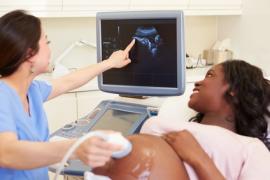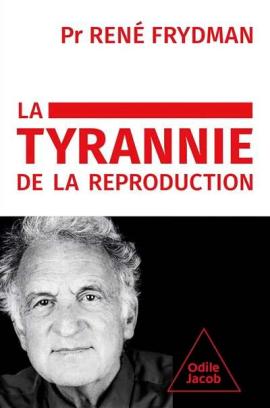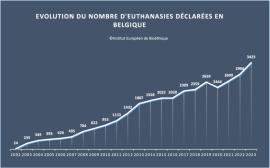All news
Surrogate motherhood: in Rome, a large panel of experts calls for an international ban on the practice
Author / Source : IEB Published on : News Temps de lecture : 2 min.

The organisation of this conference at the beginning of April 2024 came just a few days before a new meeting of the working group of the International Hague Conference (from 8 to 12 April), whose mandate includes considering the drafting of an international convention on the transnational recognition of filiation resulting from surrogate motherhood. In an open letter published on X, the International Coalition for the Abolition of Surrogacy took the opportunity to reiterate the need to put an...
 End of puberty blockers for minors: England reviews its treatment of gender dysphoria
End of puberty blockers for minors: England reviews its treatment of gender dysphoria
Author / Source : IEB Published on : News Temps de lecture : 2 min.

In 2021-2022, there were more than 5,000 referrals to the Gender Identity Development Service (GIDS) run by Tavistock and Portman NHS Foundation Trust (compared with 250 in 2011-2012). In response to this increase in cases, the NHS has asked Dr Hilary Cass, former President of the Royal College of Paediatrics and Child Health, to conduct an independent review of gender services for minors. In 2022, an interim report from this study warned of the dangers of systematically prescribing puberty...
A study highlights the link between artificial procreation and risk of placenta accreta
Author / Source : IEB Published on : News Temps de lecture : 1 min.

Published on 29 March 2024 in the journal Nature, the study examines the risk factors associated with placenta accreta* after vaginal delivery. Until now, this complication of pregnancy has been seen, in the majority of cases, in women who have had another complication of pregnancy, placenta previa. However, the study showed that more than half the cases of placenta accreta occurred in women with no previous history of placenta previa or caesarean section. But these women had had recourse to...
 Constitutionalisation of abortion in France: a high-risk symbol
Constitutionalisation of abortion in France: a high-risk symbol
Author / Source : IEB Published on : News Temps de lecture : 3 min.

At Versailles on Monday 4 March 2024, French parliamentarians meeting in Congress voted 780 to 52 to include the freedom to have an abortion in the Constitution. The single article aimed at amending article 34 of the Constitution was added to the list of citizens' rights and freedoms in the following terms: "The law shall determine the conditions under which the freedom guaranteed to a woman to have recourse to a voluntary interruption of pregnancy is exercised". "Guaranteed freedom":...
 PMA: René Frydman criticises the absolutism of the desire for a child
PMA: René Frydman criticises the absolutism of the desire for a child
Author / Source : IEB Published on : News Temps de lecture : 1 min.

At a time when fertility is controlled, delayed if necessary or brandished as a right when the desire for a child arises, René Frydman's thoughts on the new tyranny of reproduction are relevant, but also questionable. Can we use techniques that make totally artificial procreation possible without falling into the abuses he fears, such as surrogate motherhood, the dream of an artificial womb or womb transplants for transgender men? What's more, while he warns against a diversion of medicine by ...
 Protection of the embryo: the Alabama Supreme Court recognises that embryos are "unborn children"
Protection of the embryo: the Alabama Supreme Court recognises that embryos are "unborn children"
Author / Source : IEB Published on : News Temps de lecture : 1 min.

The ruling was prompted by a complaint lodged against a clinic by three couples whose embryos stored for in vitro fertilisation were accidentally destroyed in 2020. The Supreme Court based its decision on the Wrongful Death of a Minor Act of 1872. The justices relied on specific case law (Mack v. Carmack) to define the term "minor child" and to declare that unborn children fell within that definition - "regardless of stage of development and regardless of location", in the words of Justice...
 Gender reassignment: more and more Belgian teenagers are being prescribed puberty blockers
Gender reassignment: more and more Belgian teenagers are being prescribed puberty blockers
Author / Source : IEB Published on : News Temps de lecture : 1 min.

More and more teenagers in Belgium are taking puberty blockers to halt the sexual development of their bodies during adolescence. In just three years, 60% more of them have been prescribed these hormone treatments by their doctors, in an attempt to relieve the unease they feel about their biological sex. They are 684 young people between the ages of 9 and 17 in 2022, compared with 432 in 2019, reveals a survey carried out by the De Morgen (24/01/2024). Half of them are being treated at the...
 Euthanasia in Belgium: 15% increase in 2023 - Towards a normalisation of programmed death
Euthanasia in Belgium: 15% increase in 2023 - Towards a normalisation of programmed death
Author / Source : IEB Published on : News Temps de lecture : 1 min.

The figures for 2023 also confirm the increase in euthanasia for polypathologies (+3% compared with 2022), the second most common type of illness mentioned, after cancer. Euthanasia for multiple diseases thus accounts for 23.2% of all euthanasia, almost half of which (47%) were carried out when death was not expected in the short term. As the Commission points out, polypathologies refer to "a combination of suffering caused by several chronic conditions that are progressing towards a final...
 From induced death to useful death: increasing organ donation after euthanasia in Quebec
From induced death to useful death: increasing organ donation after euthanasia in Quebec
Author / Source : EIB Published on : News Temps de lecture : 1 min.

This development raises questions about the confusion that is developing around these two practices, which have completely different, if not irreconcilable, moral values. Little by little, the altruism of organ donation ends up masking the serious attack on the life and dignity of the person being euthanised. Far from being alarmed by this utilitarian shift, Dr Matthew Weiss, medical director of organ donation at Transplant Québec and author of the study, would like to increase...
 “End of life stories” to prepare for death: the Amfora association renews the approach to palliative care
“End of life stories” to prepare for death: the Amfora association renews the approach to palliative care
Author / Source : IEB Published on : News Temps de lecture : 1 min.

To develop this proposal, the Amfora association organises training courses for palliative care networks, care for the elderly and institutions for the disabled, to help them conduct and develop end-of-life interviews. Amfora also works with the Samana association, to train their volunteers to work with people at the end of their lives. These interviews are an original and creative way of developing the fourth pillar of palliative care, which aims to meet patients' spiritual and existential...
